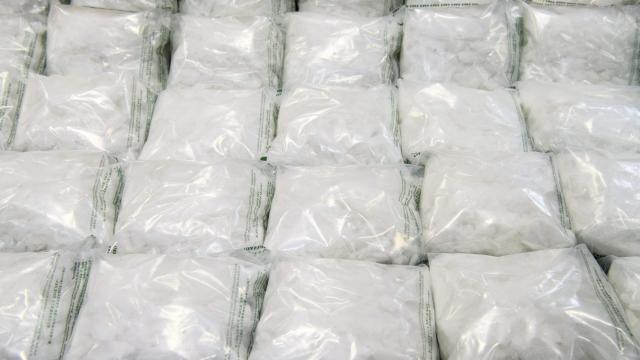When people consume drugs, they metabolise a good portion of them. But what isn’t metabolised can come out when people pee, and sewage treatment plants aren’t designed to filter those trace amounts of drugs out. That means these trace chemicals end up contaminating our waterways. In a study published in the Journal of Experimental Biology on Tuesday, behavioural ecologists looked into what effect this is having on fish populations.
The authors focused on the stimulant methamphetamine and its impact on brown trout. To examine methamphetamine’s effects on brown trout, the team examined two groups of 40 fish each, which they placed into two separate holding tanks. One tank was laced with the same levels of the drug that have been found in contaminated freshwater rivers (1 microgram per litre), and one tank had the same water conditions but no methamphetamine.
After the fish spent eight weeks in these tanks, the scientists transferred them all into a shared freshwater environment. They found that the methamphetamine-exposed fish exhibited signs of behaviour linked to addiction disorders. For their first four days out of the methamphetamine tank, they were markedly less active than the control group, which the researchers interpreted as signs of anxiety and stress — typical symptoms of methamphetamine withdrawal for humans.
Every other day while the researchers were observing the fish, they also injected water laced with similar methamphetamine concentrations to the drugged fishes’ previous home into the freshwater tank. The trout that had been exposed to methamphetamine gravitated toward the stream in 50.5% of observations, while the control group swam there in just 41.5% of cases.
“Our results suggest that emission of illicit drugs into freshwater ecosystems causes addiction in fish,” the study says.
The scientists later euthanised the fish to analyse their bodies and brain tissue. At this point, none of the fish had received a dose of methamphetamine for 10 days. Yet they still found traces of the drug in the previously exposed trouts’ brains. Similar things, the study suggests, could be happening out in the world when methamphetamine users’ runoff gets into lakes and streams.
The ecological implications of exposing fish to drugs could be serious. For instance, the new trout study suggests that methamphetamine cravings “could overshadow natural rewards like foraging or mating,” which could seriously disrupt food chains and waterways’ ecology.
This isn’t the first time scientists have found that human drug use is affecting marine creatures. A 2018 study by Italian researchers found that cocaine flushed into rivers was making eels “hyperactive” and that even low rates of exposure could damage their skeletons and muscles. In another report from the same year, scientists found that mussels in Puget Sound had tested positive for the addictive prescription opiate oxycodone. And in 2019, researchers also found traces of cocaine and ketamine in freshwater shrimp in the UK. Even commonly used medications such as anti-depressants can have impacts on marine life; a study from just last month shows that crayfish acted more “boldly” after hanging out in water laced with SSRIs.
The study calls attention to the strange environmental implications of human behaviours.
‘The elicitation of drug addiction in wild fish could represent another example of unexpected pressure on species living in urban environments,” Pavel Horký, an ecologist at the Czech University of Life Sciences’ department of zoology and fisheries who led the study, said in a statement.
